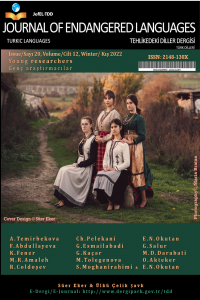Articles
Aim & Scope
Within the main framework of “endangered languages" in general and "endangered Turkic languages" in particular, "Journal of Endangered Languages" (JofEL) aims to raise awareness on the languages and cultures at various risks of extinction, to encourage scholarly efforts on the theme of endangered languages, to share the theoretical and applied studies in this regard, and to document and publicize all the phenomena regarding endangered languages.
"Journal of Endangered
Languages" (JofEL) is open to any original research bearing high
scientific value on any the following fields of study: Endangered Turkic
languages, other Eurasian languages and cultures directly in contact with
Turkic languages and communities; linguistics, Turkish linguistics, sociolinguistics,
anthropology, and culturology.
Author Guidelines
· Documents should be written in 2003 or later versions of Microsoft Office Word and also on A4 paper. Margins to be set: Bottom, 2,5 cm; top, 2,5 cm; right, 2,5 cm; left, 3 cm.
· Documents must be prepared using Times New Roman, 12-point font size, with 1,5 line spacing and 6nk paragraph spacing.
· Times New Roman is recommended for the transcription of symbols. If not, symbols should be provided with the document.
· Chapter headings must be written in boldface with single line spacing.
· Paragraphs should not be indented and text should be justified.
· Footnotes should be written using Times New Roman, 10-point font size and single line spacing
· Double emphasis should be avoided, emphasis and quotations should be indicated using single quotation marks. If there are single quotation marks and apostrophe in the text, double quotation marks should be used.
· Tables, figures and illustrations should be in high resolution format and explanations should be provided in lower case and 10-point font size below them.
· Page numbers should be added at the bottom, right side and the first page should not be numbered.
A) QUOTATIONS AND REFERENCES
· American Psychological Association (APA) style should be used in quotations and references.
· Quotations should be given using quotation marks. Quotations that are longer than 4 lines should be written indented 1,5 cm from the left and right margins, justified with single space and in smaller font.
- Quotations and citations in texts should be indicated using short citations instead of footnotes.
(Malov 1967) for the book
(Malov 1967:15) for the related page of the book
· For the works by more than one author, surnames of the first two authors should be provided and et al. should be used for the others.
(Harrison and Anderson 2003: 85)
· If the author has already been mentioned in the text, year and page number should be given in parantheses.
B) LIST OF REFERENCES
Book or Article with a single author
Book:
Ragagnin, Elisabetta. (2011) Dukhan, a Turkic variety of Northern Mongolia: Description and Analysis. (Turcologica 76.) Wiesbaden: Harrassowitz.
(1990). Essays in Comparative Altaic Linguistics. Bloomington. 271 s.
Article:
Nasilov, D. M. (2002). “Çulımskiy yazık”, Yazıki Narodov Rossii, Krasnaya Kniga, Entsiklopediçeskiy Slovar’ – Spravoçnik. Moskova: Academia, p. 250-253.
Book or Article with multiple authors
Book:
Kazgan, Gülten ve Ulçenko, Natalya (2003). Dünden Bugüne Türkiye ve Rusya. İstanbul: Bilgi Yay.
Article:
Harrison, K. David ve Anderson, Gregory D. S. (2003). “Middle Chulym: Theoretical aspects, recent fieldwork and current state”. Turkic Languages. 7/2, p. 245-256.
Edited works
Lenore A. Grenoble ve Lindsay J. Whaley (Editors) (1999). Endangered Languages: Language Loss and Community Response. Cambridge: Cambridge University Press.
Article in book:
Salminen, Tapani (2007). “Europe and North Asia”, Christopher Moseley (Der.). Encyclopedia of the world’s endangered languages. London and New York: Routledge. p. 211-280.
Translated book
Barthold, Wilhelm (2006). Türk-Moğol Ulusları Tarihi. ( Eren,H. Trans.). Ankara: TTK Yay.
Article in Newspaper
Gökhan Karakaş, “Dukhalarla İki Ay Çadırda Kaldı”. Milliyet. 1 Aralık 2012, p. 7.
Newspaper articles by anonymous authors:
“Pamir Kırgızları Konusu Kırgız Meclisi’nin Gündeminde”. Gökgazete 27 Ocak 2012, p. 8.
Governmental documents, reports and other documents by anonymous authors
Enerji Teknolojileri Politikası Çalışma Grubu Raporu. Ankara: TÜBİTAK, Mayıs 1998, p. 35.
Archived documents
Başbakanlık Cumhuriyet Arşivi. Başbakanlık Hususi Kalem. 33218, 10 Aralık 1943.
Interviews
Erdal, Marcel, Ankara, 10 Ekim 2011, interview.
Dissertations
Ödemiş, Zeynel (2005). Tyurko-mongolskiye elementı v tyurkskih yazıkah Yujnoy Sibiri. Ph.D. Dissertation. Ulan-Ude.
Online References
Online sources should be indicated using footnotes instead of short citations. These quotations should be listed under the heading of “Internet references”. Citations from Wikipedia will not be accepted.
Demir, Duygu Özge “Nanay Dili Üzerine Notlar”. 12 Kasım 2012, http://tehlikedekidiller.com/turkce/nanay-dili-uzerine-notlar.html (Date of retrieval : 10 December 2012).
Abbreviations
Turkish Language Association’s writing conventions should be followed. If a non-existing abbreviation is used, the full term should be written followed by the abbreviation in parentheses.
Avrasya’da Yeniden Çizilen Sınırlar, İnşa Edilen Kimlikler ve Türkiye (AYCIS)
C) Other issues
Please e-mail us for other related questions dergi@tehlikedekidiller.com
Ethical Principles and Publication Policy
The publication process at The Journal of Endangered Languages is the basis of the improvement and dissemination of information objectively and respectfully. Therefore, the procedures in this process improves the quality of the studies. Peer-reviewed studies are the ones that support and materialize the scientific method. At this point, it is of utmost importance that all parties included in the publication process (authors, readers and researchers, publisher, reviewers and editors) comply with the standards of ethical considerations. The Journal of Endangered Languages expects all parties to hold the following ethical responsibilities.
The following link contains ethical duties and responsibilities are written in the light of the guide and policies made by Committee on Publication Ethics (COPE).
Journal of Endangered Languages (JofEL)
This work is licensed under a Creative Commons Attribution-NonCommercial-No Derivatives 4.0 (CC BY-NC-ND 4.0) International License.

